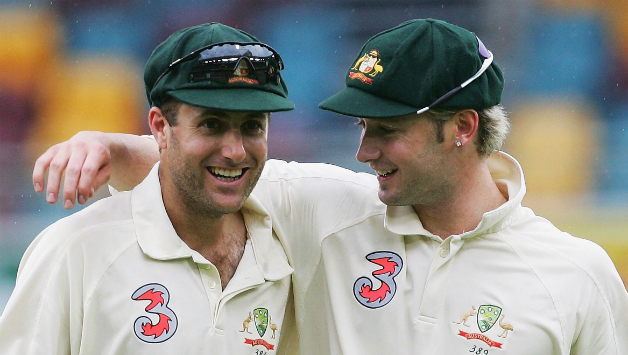Simon Katich and iconic broadcaster Gerard Whateley have taken aim at Michael Clarke over comments the former captain made about the state of Australian cricket yesterday.
As the Aussies embark on a new era of toned-down sledging where being a good bloke is as important as your cover drive, Clarke said the team needs to stop thinking about playing nice and find a formula that gets it back to winning ways as soon as possible.
“Australian cricket I think needs to stop worrying about being liked and start worrying about being respected,” Clarke told Macquarie Sports Radio.
“Play tough, Australian cricket, because whether we like it or not, that is in our blood.
“If you try and walk away from it, yeah we might be the most liked team in the world, we’re not going to win s**t, we won’t win a game. All we can do is want to win.”
That view is hardly the popular one after the ball tampering scandal in South Africa and damning cultural reviews into both the team and Cricket Australia prompted a rethink into how the national team should go about its business, and Katich took a swipe at Clarke for missing the mark.
“Once again we find someone missing the point,” Katich told Whateley on SEN radio today. “What’s been forgotten in this is we blatantly cheated and there’s a reason we’re at this point now.
“We were caught for blatantly cheating and we have to rectify that as quickly as possible and earn back the respect not just of the cricketing public in Australia but worldwide and our behaviour’s a big part of that.”
Katich said it was possible to be both liked and respected but words meant nothing without action and he didn’t believe Clarke grasped the gravity of the situation.
“That’s been missed in this, that’s never happened in Australian cricket before.
“The players understand, the three players that have been banned understand the enormity of it because they’ve lived through this period.
“This is where those on the periphery need to be mindful that what happened should never have happened in Australian cricket and it did and we were guilty of blatant cheating … that needs to be reminded to a few of these guys commenting on it.”
Whateley shared Katich’s sentiment and blasted Clarke for refusing to accept the reality Australian cricket had created for itself, saying the ugly nature of Australia’s on field behaviour was “a scourge that is part of Clarke’s legacy”.
“Clarke’s interpretation of the predicament the Australian men’s Test team finds itself in is breathtaking,” Whateley said. “That he would continue to rely on the line — the fiction his and subsequent teams used to excuse all manner of boorish behaviour — might be the single greatest piece of nonsense over the past nine months.
“The Test summer before us is a critical moment of recalibration and Paine and his team who are left with the tremendous responsibility of restoring the national cricketing character deserve better than what Clarke is espousing.
“To hear it, to read it just made me angry.”
Katich, who played 56 Tests and has been touted as a potential candidate to replace Mark Taylor on the CA board, has fiercely defended the bans handed out to Steve Smith, David Warner and Cameron Bancroft for their roles in the ball tampering saga.
As calls grew for the trio to be welcomed back into domestic cricket this summer, Katich was adamant the suspensions had to remain in full. His wish was granted last week when CA rejected a proposal by the Australian Cricketers’ Association to have the bans overturned or at least downgraded.
Katich’s swipe at Clarke is the latest blow in their bitter feud that was first exposed in a dressing room bust-up in 2009. Clarke reportedly wanted to leave the inner sanctum after a Test win in Sydney to attend a function and became angry the singing of the team song was being delayed.
Katich reportedly grabbed Clarke by the throat when his teammate confronted him about why the song wasn’t being sung.







